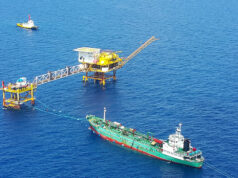By Carmina Angelica V. Olano
Researcher
INVESTORS sold off Ayala Land, Inc. (ALI) shares last week after the property developer’s decision to cut capital expenditures (capex) for the year because of overall market weakness brought about by the coronavirus disease 2019 (COVID-19) pandemic.
A total of 50.33 million ALI shares worth P1.53 billion were traded from April 20 to 24, data from the Philippine Stock Exchange (PSE) showed.
Shares in the Ayala-led real estate developer closed at P28.9 apiece on Friday, 8.4% lower than P31.55-per-share closing price a week ago. The stock has declined 35.6% since the start of the year.
“The company’s capex cut for 2020 mainly dragged ALI’s performance [last] week, as reflected with the 8.4% decline week-on-week. The dampened investor sentiment can also be seen with the significant net foreign outflow amounting to P437.7 million, with ALI being the second largest net foreign selling stock for the week, following SM Prime Holdings, Inc.,” said Charlene Ericka P. Reyes, officer-in-charge of trading and research at First Resources Management and Securities, Inc. in an e-mail.
“With the coronavirus pandemic expected to take a toll on Ayala Land’s financial performance this year, the company is seen to prepare for the worst as they slashed its capex by more than a third and postponed the launch of new projects and land acquisitions to ensure strong financial position throughout the crisis,” she added.
China Bank Securities Corp. Senior Research Associate Rastine Mackie D. Mercado shared a similar assessment, adding that investors have also priced in the impact of an extended enhanced community quarantine (ECQ) to its business.
“The downtick in capex is also likely to delay some pipeline developments which could lead to some impact on short- to medium-term revenue and profit expectations,” Mr. Mercado said.
“Moreover, it was made known on Friday that the ECQ will be extended for some parts of the country — so part of the uptick in trading [value] may be due to investors trying to price in this new development,” he added.
In its annual shareholder’s meeting on Wednesday, ALI announced to cut its 2020 capital expenditure by 36% to P70 billion from the original estimate of P110 billion as it focuses funds on essential expenditures and critical projects.
In the same meeting, ALI President and Chief Executive Officer Bernard Vincent O. Dy noted that many of its revenue generating businesses have been significantly affected by the ECQ with the company expecting a “major impact” on its performance this year from the ongoing pandemic, with a “high likelihood” of a spillover next year.
Since the ECQ, ALI has closed all its malls and resorts and some of its hotels and offices across the country, except for more than 90% of its spaces and nine out of 11 of its hotels, albeit on limited operations.
On Friday, President Rodrigo R. Duterte extended the ECQ until May 15 in Metro Manila, Central Luzon, Calabarzon (Cavite, Laguna, Batangas, Rizal, and Quezon), among other areas.
“Earnings of the company is expected to be dragged down across its business segments, with the company estimating around P1.4 billion in recurring income forgone on mall closures, and the demand for office spaces and residential projects dented by the slowing economic growth,” First Resources’ Ms. Reyes said.
For China Bank Securities’ Mr. Mercado, ALI’s topline and bottom line growth is “likely to take a hit” in 2020 due to the ECQ’s impact on its retail and residential leasing businesses.
“[I]ts retail leasing business…may be further impacted due to the extension of the ECQ in some areas,” he said, referring to ALI’s previous decision to waive around P2.6 billion in rent condonation for merchants covering the 1.5-month ECQ.
Mr. Mercado also expects ALI’s residential business to slow since the firm said it would not be launching new projects this year. “Recall that around P125 billion in projects were set to be launched this year,” he said.
“The firm’s office space leasing business, however, remained a bright spot as ALI said that over 90% of its tenants remained operational. Overall, the recovery in the firm’s topline and bottomline growth is likely to be determined by continuing developments around the COVID-19 pandemic.”
ALI reported a 13.5% growth in its attributable net income to P33.19 billion in 2019 from P29.24 billion the year before. The double-digit profit growth comes even as revenues grew by just 1.8% to P168.71 billion.
“ALI may continue to trend sideways [this week]… navigating a range between P28.70 to P34.20,” China Bank Securities’ Mr. Mercado said.
First Resources’ Ms. Reyes said ALI’s share price has peaked its uptrend at P34.50. “Closing below P30.00 may trigger a possible sell-off as deep as the P25 to P26 range,” she said.
“We maintain our cautious stance for the property sector in general, especially that the market may continue to experience wild swings in the short-term. However, we think that ALI is currently trading with attractive valuations, thus long-term investors may accumulate in tranches,” Ms. Reyes added.



